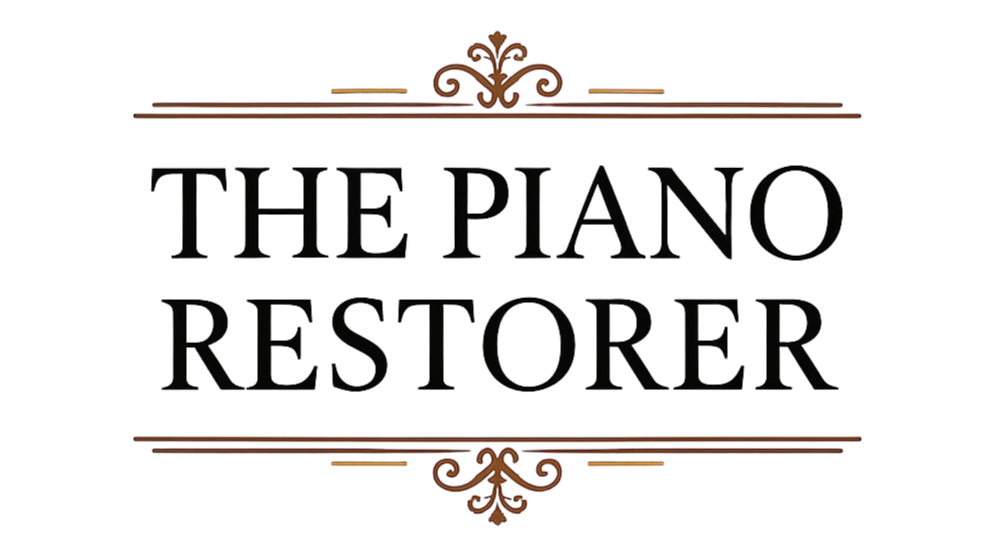How to Tell if Your Piano Needs Restoration
Introduction – What Piano Restoration Really Means
Piano restoration is more than just fixing a broken key or tuning a few strings. It’s a comprehensive process that brings an instrument back to its former glory—both visually and acoustically. Whether it’s an upright that’s been in your family for generations or a grand piano that has lost its elegance, restoration may be the best way to preserve its beauty, sound, and value.
But how do you know when your piano needs more than a quick repair?
Visible Signs Your Piano May Need Restoration
Some of the clearest indicators are right in front of you. Look for:
Cracked Soundboard: The soundboard is crucial to the piano's resonance. Cracks, though common in older instruments, may compromise sound quality if severe. It’s a common myth that a cracked soundboard is a death sentence for a piano, but this is not the case! An experienced piano restorer can repair a cracked soundboard, ensuring the piano fills its tonal potential.
Worn or Flattened Hammers: These affect tone clarity and dynamics. If hammers are grooved or misshapen, they likely need replacing or reshaping.
Sticky or Broken Keys: Keys that don't return properly or are physically damaged are a common sign of deeper action issues. Also ivory keytops that have come loose, it is essential to keep any ivory that has come off to be able to retain a full ivory keyboard.
Damaged Cabinet or Veneer: While cosmetic, this can indicate overall neglect or age—and is often addressed during full restoration. Most antique pianos use a water soluble animal hide glue, so a piano has been kept in a particularly dry or damp environment, it is likely the glue joints could be affected by the moisture or movement of the wood.
Audible Clues – What Your Piano Might Be Trying to Tell You
If your piano is no longer sounding as sweet as it once did, pay attention to:
Buzzing or Rattling Sounds: Although buzzes and rattles can often be causes by foreign objects inside the piano, they can point to more severe issues such as loose components, cracked bridges, or a failing soundboard.
Tuning Instability: If your piano won’t hold a tune despite regular tuning, the issue might be a worn pinblock(wrest plank in the UK!) or loose tuning pins. The wrest plank wood can go soft over time, or the holes misshapen after years of tuning.
Loss of Tone and Power: A dull, lifeless tone can result from hardened hammers, a stiff action, ageing and rusty strings, or a damaged or sunken soundboard.
How Old Is Your Piano?
Pianos are built to last (most of them anyway), but even the best-made instruments need rejuvenation after decades of use.
If your piano is 50+ years old and hasn’t been restored, a full assessment is wise, even if it has been regularly tuned.
Antique pianos often benefit from restoration to preserve their craftsmanship. It is always worth considering repairing your current piano before replacing it.
Even quality instruments from the mid-to late-20th century may be overdue for internal upgrades, especially if played regularly.
DIY Fixes vs Professional Restoration
It’s tempting to fix small issues yourself—but pianos are intricate, sensitive instruments. While basic care like dusting or cleaning keys is safe, internal repairs, hammer work, and structural adjustments should always be handled by a professional restorer.
Why? Because a quick fix in the wrong place can cause more damage—and reduce the piano’s long-term value.
When It’s Worth Restoring a Piano
Restoration is an investment, but one that can be truly worthwhile in certain cases:
Emotional Value: A family heirloom deserves to be preserved for future generations.
Historical Significance: Older or rare pianos often have unique craftsmanship that’s impossible to replicate today.
High-Quality Brands: Pianos by Steinway, Bechstein, Blüthner, and similar makers are often worth restoring due to their enduring build quality.
Ready to Bring Your Piano Back to Life?
If you're noticing these signs or just wondering about the condition of your piano, it might be time for a professional evaluation.
Schedule a no-obligation inspection and let us assess whether your upright or grand piano is ready for restoration. We’ll walk you through the process, costs, and options tailored to your instrument.
